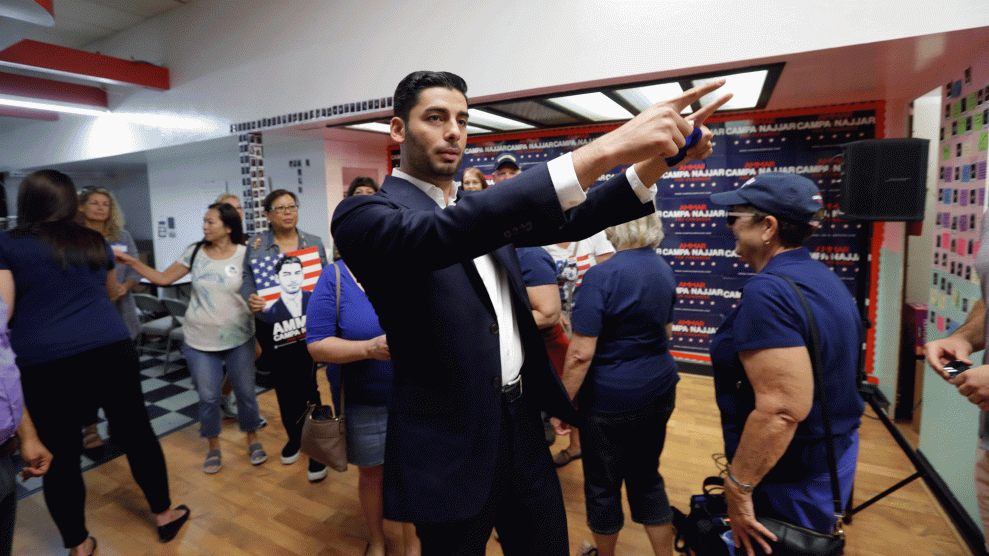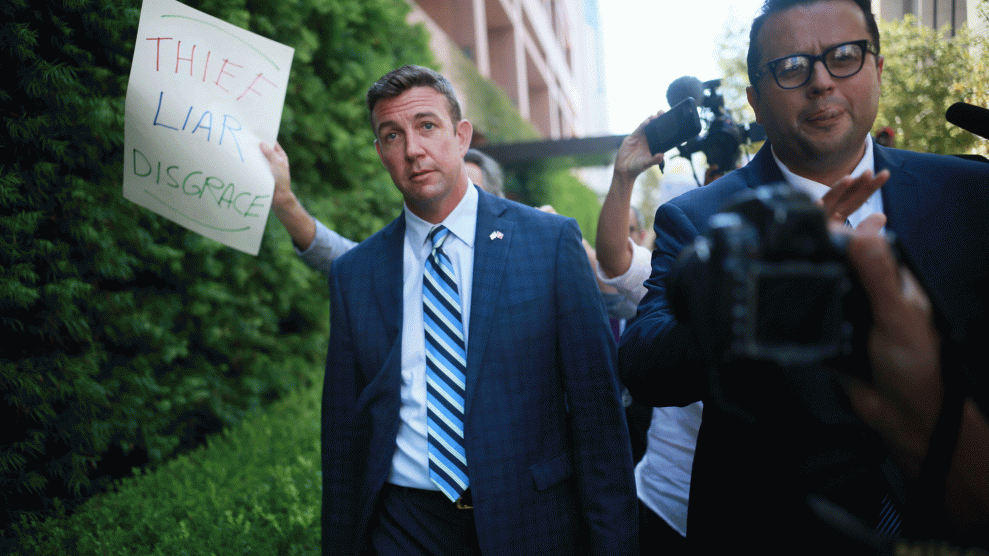
Gregory Bull/AP
When the Democratic Congressional Campaign Committee unveiled its list of 2020 House battlegrounds last week, it included a blood-red district it had overlooked in 2018: California’s 50th, one of the most conservative districts in the state. It is represented by Rep. Duncan Hunter Jr., a Republican who has become a pariah on Capitol Hill even within his own party. Facing a 60-count federal indictment over allegedly filing false campaign finance records and misusing $250,000 in campaign funds for personal expenses like vacations and flying his family’s pet rabbit around the country, Hunter has been stripped of his committee assignments and can no longer participate in crafting bills. While he waits for his trial to begin in September, he’s essentially stuck, as Politico put it, “aimlessly roaming the hallways.”
All of which is good news for Ammar Campa-Najjar. The DCCC “knows what all of us know: Hunter’s days are numbered,” says Campa-Najjar, the 29-year-old Democrat who came within striking distance of Hunter in November. On January 3, the same day that the new Democratic House majority was seated, Campa-Najjar announced he would run against Hunter again in 2020. By announcing his candidacy so early, he’s getting a jump on the competition—and he’s hoping to keep some of the momentum from his first campaign.
During his 2018 campaign, Campa-Najjar claims, “everywhere we went, we won.” Now his strategy is to reach out to the people and communities he didn’t get around to in the last cycle. “We gotta go to more places,” he says. Campa-Najjar says he’s been visiting local chapters of Veterans of Foreign Wars and towns like Alpine, Hunter’s hometown, which is known as one of the more conservative slices of the already Republican-dominated district. “I’m not shoving my agenda down their throat,” he says, “but sitting back and listening and trying to be there for them at a time when at least half the district believes we deserve better than Duncan Hunter.”
Campa-Najjar anticipates that other Republicans will challenge Hunter, but thinks they will “wait and watch” to see what happens at his trial. “That gives me close to a year to myself to make inroads in the district,” he says. “I have from now until at least September to build relationships.”
Campa-Najjar came closer to ousting Hunter than any other Democrat before him, with 48 percent of the vote. By comparison, Hunter was reelected with more than 63 percent of the vote in 2016, and Donald Trump beat Hillary Clinton in the district by 15 points. Throughout his 2018 campaign, Campa-Najjar received precious little support from the DCCC, which had targeted seats it saw as more flippable. (A representative from the DCCC was not available for comment before publication.) “Obviously I would have loved their support—because we would have won,” he says, though he acknowledges that the odds for a Democrat in the district looked poor. “From the bird’s-eye view, you wouldn’t play in this district. Now, we’ve put it in play.”
When Campa-Najjar entered the race in April 2017, he became known merely as “the hot guy running for Congress,” a long shot with a pretty face. Then Hunter’s indictment landed in August, thrusting Campa-Najjar into the national spotlight and forcing him to prove himself as a serious candidate. He managed to raise $4 million through small dollar donors from across the country.
Campa-Najjar, a Palestinian Mexican American and Christian, also survived the Hunter campaign’s racist attack ads and comments, which suggested that he was a “radical” Muslim trying to “infiltrate” Congress. The ads attempted to tie him to his grandfather, who was part of the terrorist group that attacked the 1972 Munich Olympics, even though Campa-Najjar was born 16 years after his death. Former Rep. Duncan Hunter Sr., who represented the district before his son, hosted a press conference where he called Campa-Najjar a “security risk.”
When the votes were tallied, Campa-Najjar proved how much support he was able to gather—and how ineffective Hunter’s racist ads had been. “If those claims landed, I would not have lost so narrowly. A ‘terrorist’ would not lose by 2.7 percent,” he says. “We lost because there’s 50,000 more Republicans in the district and trust takes a long time to build.”
Despite his defeat, Campa-Najjar’s transformation into a contender still carries weight in the district. “He did remarkably well for that district in 2018,” says Gary Jacobson, a political science professor at the University of California-San Diego. “And his move to run again is not surprising.” There are two classes of losing candidates who run a second time, Jacobson notes: “Those who come close and who think they can build some momentum for the next time around, and those random candidates who just like to run.” Campa-Najjar, says Jacabson, is in the former category, “and success rates for those candidates is not bad.”
Campa-Najjar says his major donors remain “all in” and are “still gung-ho” for his 2020 bid. To them, “it would not just be a symbolic gesture to get Hunter out of office, it would be a real win—to uphold the public trust and have a congressman serving their district as opposed to being embroiled in his own scandals.” He’s already garnered several endorsements, from California Reps. Mike Levin, Scott Peters, and Eric Swalwell; State Controller Betty Yee; and Rep. Tony Cárdenas, the former head of the Congressional Hispanic Caucus.
Nonetheless, Republicans still have a 15-point voter advantage in the district. Even though Campa-Najjar is a serious candidate, his prospects are “not good,” says Jacobson. “He came pretty close last time, but that’s because Hunter was under indictment. By the time the next election comes around, Hunter will either be gone or he will be exonerated. In either case, a Democrat is not going to win that district.”
Pete Beauregard, a political and environmental activist who ran for Hunter’s seat in 2018 before throwing his support behind Campa-Najjar, disagrees. “He has an absolutely great chance,” he says, so long as he sticks to issues and doesn’t make Hunter more of an issue than he already is. In 2018, Campa-Najjar mostly kept his talking points focused on issues facing the district: water infrastructure, traffic, jobs, education, and health care. But after Hunter ran his attack ads, Campa-Najjar also went on the offense. “There were voters who were on the fence who just might vote for Ammar, but when Ammar came out with these negative ads, that’s where he lost them,” Beauregard says.
Beauregard views Campa-Najjar’s early efforts to restart his campaign as critical to his success. “It is significant that he keeps himself right on everybody’s mind. We have a lot of issues in the 50th that haven’t been addressed—social issues, environmental, and political issues—that have been stalemated and pushed into the corner. The dynasty of the Hunters has kind of kept it that way.”
“We’re the afterthought of San Diego,” says Campa-Najjar, referring to the 50th, an inland district that covers much of northeastern San Diego County and a small portion of Riverside County. “We get the scraps from the county—and people feel it. They don’t trust government and they don’t trust elites. I believe they want someone who will be fighting for them in Washington.”
And, notes Campa-Najjar of Hunter, “Right, wrong, or indifferent, regardless of whether you agree with him, the reality is the same: He’s not able to do the job of a full-fledged congressman.” Hunter has pleaded not guilty to the charges against him and has floated the conspiracy theory that his legal problems are the result of a hit job by a Democrat-controlled FBI.
The only way Jacobson sees Campa-Najjar winning is if Hunter beats any Republican challengers in the primary and his legal woes proceed to get worse. “Then a Democrat would have a shot at him in a presidential election year, when turnout is going to be higher among Democrats.”
Campa-Najjar is aware of this possibility. “It might be a scenario where he and I are on the ballot and he gets convicted afterward and it’s too late, and voters get to pick between me and a guy in jail. I welcome that scenario.”








